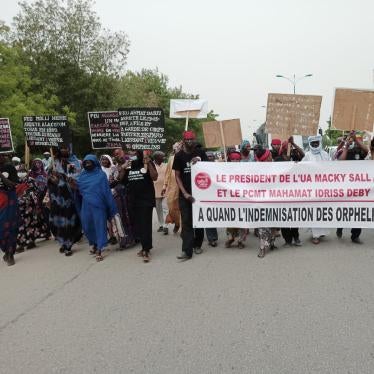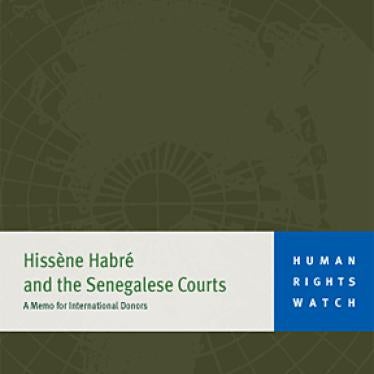(Dakar, Senegal) - Senegal's highest court today ruled that Chad's exiled former president, Hissène Habré, could not stand trial on torture charges because his alleged crimes were not committed in Senegal.
Victims and their supporters protested the decision, which they said flew in the face of international law, and immediately announced that they would continue to seek Habré's trial in Senegal or elsewhere.
"This wrongheaded ruling will not end the quest for justice," said Reed Brody, Advocacy Director of Human Rights Watch, one of the organizations that initiated the criminal action against Habré. "If Senegal will not put Habré on trial for his atrocities, we will ask it to hand him over to a country that will."
"Today's decision is a disappointment and a step backwards for the rule of law, " said the Senegalese lawyer, Sidiki Kaba, who is the president of the International Federation of Human Rights Leagues (FIDH). Senegal's President Abdoulaye Wade has said that if there is to be a trial of Habré, it should be in Chad or in countries like France or the United States which backed Habré's 1982-1990 rule.
Brody said that the victims were actively exploring avenues for Habré's extradition for trial in a third country. He also noted that Habré's trial in Senegal on related charges of crimes against humanity was still possible. Last February, a magistrate initiated an investigation for crimes against humanity in Chad, a probe that remains open. The victims will also file a petition with the United Nations Committee against Torture.
In its ruling today, a three-judge panel of the Cour de Cassation, Senegal's highest court, said that Senegal had no jurisdiction to pursue crimes not committed in Senegal.
Human rights organizations said that the decision flouted Senegal's legal obligation under the 1984 United Nations Convention against Torture, which Senegal ratified in 1986, to prosecute alleged torturers who enter its territory. Under the Senegalese constitution, international treaties, once ratified, override Senegal's legal code.
Habré's victims reacted harshly to today's ruling. "After so much suffering and then so much hope, I feel betrayed by Senegalese justice," said Ismael Hachim, 42, President of the Chadian Association of Victims of Political Repression and Crime (AVCRP), who spent 2 years in Habré's prison and was subject to the "Arbatachar," a frequent form of torture, in which a prisoner's four limbs were tied together behind his back, leading to loss of circulation and paralysis. "But facts are stubborn things and the evidence of Habré's crimes is finally being presented to the world. Hissène Habré has not seen the last of his victims."
Senegalese groups also responded with dismay. "My country lost an opportunity to break the tragic cycle of impunity," said Alioune Tine of the Dakar-based African Assembly for the Defense of Human Rights (RADDHO). "This decision is an invitation to Africa's blood-stained tryants to plan their retirement in Senegal where no one can come after them." Tine said he would seek a change in Senegal's laws.
Seven individual Chadians brought the case as private plaintiffs, along with the AVCRP, which represents 792 victims of Habre's brutality. In January 2000, the victims provided details of 97 cases of political killings, 142 cases of torture and 100 cases of "disappearance" committed by Habré 's forces during his 1982?1990 rule.
In February 2000, Judge Demba Kandji of the Dakar Regional Court indicted Habré on torture charges, and placed him under house arrest. Kandji also opened an investigation into crimes against humanity in Chad. On July 4, 2000, the Court of Appeals dismissed the charges against Habré, ruling that Senegal had not enacted legislation to implement the Convention against Torture and therefore had no jurisdiction to pursue the charges because the crimes were not committed in Senegal. The dismissal drew protests from the United Nations, Senegal's association of judges, and rights activists around the world.
Habré, now 58, took power in Chad in 1982, overthrowing Goukouni Wedeye. Habré's one-party regime was marked by widespread abuse and campaigns against the ethnic Sara (1984), Hadjerai (1987) and the Zaghawa (1989). Habré was deposed in December 1990 and has lived in Senegal since. The exact number of Habre's victims is not known. A truth commission established by the current Chadian government accused Habre's government of 40,000 political murders and systematic torture.
Habré's indictment in Senegal has already had an impact back in Chad. On October 26, 2000, the Chadian victims who initiated the case in Dakar filed criminal charges in Chadian courts against their direct torturers, many of whom remain in positions of power in Chad, for torture, murder, and "disappearance." That case is now before Chad's Constitutional Court.







